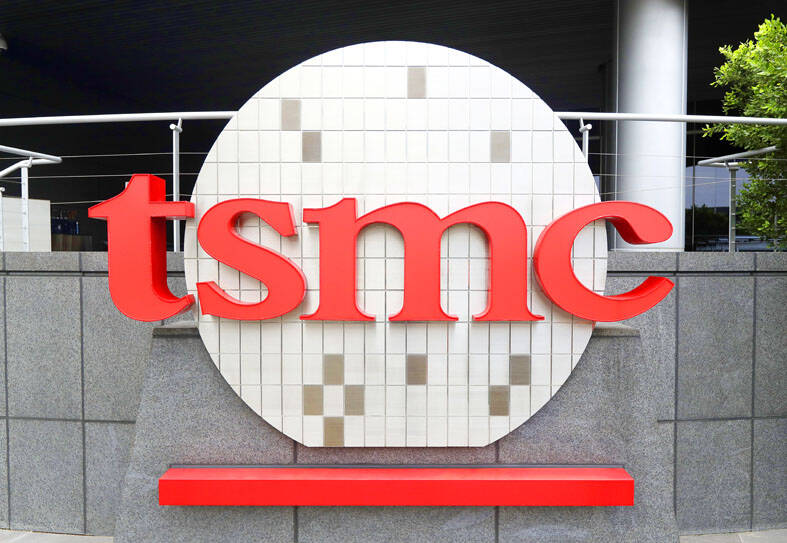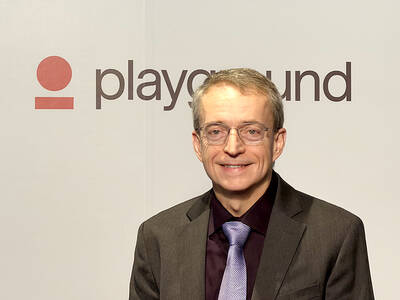Taiwan Semiconductor Manufacturing Co (TSMC, 台積電) sees currency volatility as a “big uncertainty” to its margins and is to constantly review hedging strategies to manage the impact, TSMC chief financial officer Wendell Huang (黃仁昭) said.
“Foreign exchange rate is something that we cannot control, but there were instances before where it was not in our favor, but we managed to lean on other factors so that we are able to keep our profitability, and that’s what we are planning to do,” Huang said in an interview yesterday.
“We use different hedging alternatives. The first one is to just simply sell the US dollar in the spot market,” Huang said. “We also use forwards contracts, and we also move part of the cash, the US dollar cash, to an offshore holding company whose financial statements are denominated in the US dollar.”

Photo: Chiang Ying-ying, AP
Huang’s comments came after TSMC, the world’s biggest contract chipmaker, on Thursday reported better-than-expected second-quarter earnings and raised its outlook for this year’s revenue, a move that underscores resilient demand from the global artificial intelligence spending spree.
TSMC shares rose 2.21 percent in Taipei trading, after its stock that trades in the US rose 3.4 percent overnight.
Despite the bright prospects, TSMC and other Taiwanese exporters, as well as life insurers with heavy exposure to US assets, face challenges from a red-hot New Taiwan dollar that has surged more than 11 percent this year against the greenback.
During an earnings call on Thursday, Huang warned TSMC’s third-quarter performance would likely face a bigger hit from a strong NT dollar. Huang estimated that every 1 percent appreciation of the NT dollar against the greenback would reduce the firm’s revenue by 1 percent.
The firm last month said that it is set to inject US$10 billion in capital into an overseas unit to shore up currency hedging operations.
To help soften the blow from a stronger NT dollar, which has rallied amid equity fund inflows and exporters’ US dollar sales, Taiwanese authorities have taken steps, including market interventions and warnings against speculative bets.
Bloomberg News earlier this month reported that the central bank is seeking feedback on a plan to tighten currency purchases by foreign stock investors.
TSMC will remain prudent about spending this year while expanding globally to meet surging artificial intelligence (AI) chip demand, as the main supplier of chips to Apple Inc and Nvidia Corp is sitting tight for now on plans to set aside a maximum US$42 billion for capital expenditure this year, Huang said.
TSMC is spending US$165 billion to build capacity in Arizona, part of a global expansion intended to help meet future demand for the components fundamental to AI. On Thursday, it raised its full-year sales growth forecast to 30 percent, reinforcing expectations that big tech firms from Meta Platforms Inc to Google will keep spending billions of dollars on data centers.
US Secretary of Commerce Howard Lutnick said the administration aims to bring the full chip supply-chain back to the US from Asia during a congressional hearing this year. Huang said it will take years for the US to achieve that.
Still, TSMC is accelerating its timeline in the US. Huang said the company’s second plant in Arizona may start volume production by 2027, pulling its schedule in by several quarters. The Taiwanese chipmaker may also speed up construction of a third plant due to customer demand. The company envisions that about 30 percent of its 2-nanometer or more advanced capacity will be located in Arizona eventually.
That timing depends in part on the macroeconomic and geopolitical environment. Trump is threatening to levy tariffs on semiconductors and electronics, with the potential to shake up a tech supply chain that often relies on shipping components at speed around the world. Huang said the uncertainties prompted TSMC to get a bit conservative about their current forecast.
“We are mindful about macro uncertainties these days, primarily related to tariff policies, so we are being prudent about planning our capex,” Huang said.

JITTERS: Nexperia has a 20 percent market share for chips powering simpler features such as window controls, and changing supply chains could take years European carmakers are looking into ways to scratch components made with parts from China, spooked by deepening geopolitical spats playing out through chipmaker Nexperia BV and Beijing’s export controls on rare earths. To protect operations from trade ructions, several automakers are pushing major suppliers to find permanent alternatives to Chinese semiconductors, people familiar with the matter said. The industry is considering broader changes to its supply chain to adapt to shifting geopolitics, Europe’s main suppliers lobby CLEPA head Matthias Zink said. “We had some indications already — questions like: ‘How can you supply me without this dependency on China?’” Zink, who also

The number of Taiwanese working in the US rose to a record high of 137,000 last year, driven largely by Taiwan Semiconductor Manufacturing Co’s (TSMC, 台積電) rapid overseas expansion, according to government data released yesterday. A total of 666,000 Taiwanese nationals were employed abroad last year, an increase of 45,000 from 2023 and the highest level since the COVID-19 pandemic, data from the Directorate-General of Budget, Accounting and Statistics (DGBAS) showed. Overseas employment had steadily increased between 2009 and 2019, peaking at 739,000, before plunging to 319,000 in 2021 amid US-China trade tensions, global supply chain shifts, reshoring by Taiwanese companies and

Taiwan Semiconductor Manufacturing Co (TSMC, 台積電) received about NT$147 billion (US$4.71 billion) in subsidies from the US, Japanese, German and Chinese governments over the past two years for its global expansion. Financial data compiled by the world’s largest contract chipmaker showed the company secured NT$4.77 billion in subsidies from the governments in the third quarter, bringing the total for the first three quarters of the year to about NT$71.9 billion. Along with the NT$75.16 billion in financial aid TSMC received last year, the chipmaker obtained NT$147 billion in subsidies in almost two years, the data showed. The subsidies received by its subsidiaries —

OUTLOOK: Pat Gelsinger said he did not expect the heavy AI infrastructure investments by the major cloud service providers to cause an AI bubble to burst soon Building a resilient energy supply chain is crucial for Taiwan to develop artificial intelligence (AI) technology and grow its economy, former Intel Corp chief executive officer Pat Gelsinger said yesterday. Gelsinger, now a general partner at the US venture capital firm Playground Global LLC, was asked at a news conference in Taipei about his views on Taiwan’s hardware development and growing concern over an AI bubble. “Today, the greatest issue in Taiwan isn’t even in the software or in architecture. It is energy,” Gelsinger said. “You are not in the position to have a resilient energy supply chain, and that,